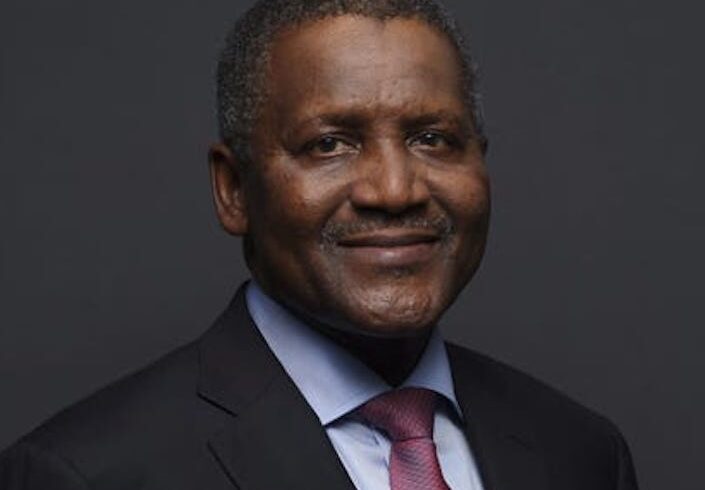
•Set to list 10% of company’s shares by next year
•S&P reports oil firm secured $4bn critical financing agreement in August
•Says company pursuing Middle Eastern partners
•40,000 bpd upstream assets to begin production by end of October
Emmanuel Addeh in Abuja
The 650,000 barrels per day Dangote Refinery is set to more than double its current refining capacity to about 1.4 million bpd, becoming the world’s largest refining facility and surpassing the 1.36 million bpd refinery in Jamnagar, India.
President and Founder of the Dangote Industries Limited (DIL), Aliko Dangote, told S&P Global Commodity Insights, in an interview, that the management of the $20 billion refining and petrochemicals complex, is also thinking of altering its current business model and is set to list up to 10 per cent of its shares by next year.
According to the 68-year-old founder, although the ambition to develop African energy independence is a “herculean task”, it remains a ‘labour of love’ since no government in Africa is willing to put its money into such humongous projects.
“We have to build the refinery again, either here or somewhere else. But really, somewhere else is not possible because we’d have to go and spend so much building infrastructure, and we have the infrastructure already here,” Dangote said.
In Nigeria alone, S&P Global Commodity Insights projects that net petrol imports could more than double from 2026-27 to hit almost 200,000 bpd by 2030, underpinned by economic development and rapid population growth.
In July, Dangote unveiled plans to expand the refinery from its current 650,000 bpd to 700,000 bpd by the end of the year. Now, the target is to reach 1.4 million bd, with no specified date, it added.
Engineers working at the Lekki complex say it was designed with room for growth, pointing out empty concrete plots capable of holding a second refining system. Now Nigeria’s largest power producer, the Dangote Group already generates twice the electricity it consumes, insuring its operations against chronic shortages that plague the rest of the country.
Expanding could involve building a second refinery with the same configuration, one engineer said, potentially with the addition of a vacuum distillation unit to boost light ends yields, the S&P report said.
The company is also working on potential linear alkylbenzene and base oils projects, and aims to grow its annual polypropylene capacity from 1 million mt to 1.5 million mt in the next few years, Dangote said.
However, Dangote rejected a model that leaves Africa dependent on imported fuel, and said he remains determined to disrupt a market shaped by economies of scale. He is not optimistic for state-backed African projects, and warns that the continent will “really be in trouble” without huge private investment.
“Most African governments will not have the capacity to build a refinery,” Dangote said, calling smaller projects like Angola’s new Cabinda facility “a drop in the ocean.”
“In places where interest rates are 30 per cent, some countries 20 per cent, the cost of funding is high. And the infrastructure is zero,” he said.
According to the report, the Nigerian company’s own maturing debt was recently seen as a key funding hurdle, before it secured a critical $4 billion financing agreement in August.
To expand the refinery and develop a new petrochemicals project in China, Dangote is actively considering a strategic partnership with Middle Eastern companies, the group president remarked. “Our business concept is going to change. Now instead of being 100 per cent Dangote-owned, we’ll have other partners,” he said.
Within the next year, Dangote disclosed that the refining business will list 5 per cent to 10 per cent of its shares on the Nigerian Stock Exchange, mirroring a playbook established by the group’s cement and sugar businesses.
“We don’t want to keep more than 65 per cent to 70 per cent,” Dangote told S&P, explaining that shares will be offered incrementally subject to investor appetite and market depth.
According to him, the door remains open for the Nigerian National Petroleum Company Limited (NNPC) to boost its stake after the state oil company trimmed its interest to 7.2 per cent, but not before its next phase of growth is well underway.
“I want to demonstrate what this refinery can do, then we can sit down and talk,” Dangote said. A close aide, who was not authorised to speak publicly, told S&P that the company would exert caution before inviting additional participation from NNPC.
While there are bold expansion plans amid ongoing efforts to stabilise the refinery, it stated that the plant’s main petrol engine, the Residue Fluid Catalytic Cracker (RFCC), recently went offline in September shortly after a three-week turnaround in August, fueling rampant speculation over future downtime.
A Vice President at Dangote responsible for overseeing refinery operations, Devakumar Edwin, said the RFCC restarted around October 7 and should soon be back at full capacity.
“We have resolved most, not all, but most of the problems. And I think we’re looking for a window when we shut down for another month,” Dangote said, in a rare comment on maintenance plans.
The month-long turnaround will involve shutting down the RFCC, but not the Crude Distillation Unit (CDU) and other secondary units. The entire refinery only requires a full turnaround every five years, Edwin said. Dangote said that the RFCC turnaround will be planned to avoid clashing with a seasonal demand peak towards the year-end, without providing dates.
The company recently highlighted employee sabotage as a potential business risk, before its decision to fire 800 staff members sparked an acrimonious labor strike in September. After government-brokered remediation talks, the conglomerate has committed to find new employment for all dismissed workers, mostly outside the refining business.
“We don’t have any worries with the unions,” Dangote said, sharing that the reorganisation was almost complete and deemed sufficient to abate recent tensions.
As the refinery grows, the report said that early challenges sourcing crude oil only risk becoming more acute. However, Dangote welcomed a breakthrough deal with NNPC to alleviate supply concerns.
Under a current “crude for naira” swap agreement, NNPC supplies Dangote with 14 crude oil cargoes, or sources the equivalent value of US dollars, in exchange for the same volume of petrol and gasoil to be supplied in the domestic currency.
Besides, Dangote’s upstream assets in the Niger Delta, Oil Mining Lease 71 and 72, could soon provide another supply injection, with production expected to start this month and reach up to 40,000 bpd.
Dangote remains interested in new upstream opportunities, which could add to an expanding asset base for the wider conglomerate. Recent investments include a major Namibian storage terminal, an Ethiopian fertilizer plant and a fleet of 4,000 CNG trucks, as well as a potential energy project in Senegal.





